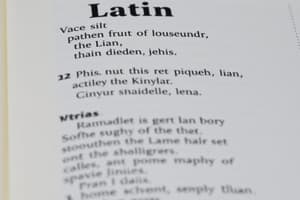Podcast
Questions and Answers
Which of the following scenarios would necessitate the use of the word foedus?
Which of the following scenarios would necessitate the use of the word foedus?
- Indicating a delay in the construction of a defensive barrier.
- Referring to the death of a leader in battle.
- Narrating the negotiation of terms between warring factions. (correct)
- Describing the location of soldiers within a city.
Which verb from the list best describes the action of erecting a new building?
Which verb from the list best describes the action of erecting a new building?
- Colligo, colligere, collegi
- Aedifico, aedificare, aedificavi (correct)
- Deleo, delere, delevi
- Defendo, defendere, defendi
In what context would mora most appropriately be used?
In what context would mora most appropriately be used?
- To express the numerous challenges faced by `miles` in battle.
- To describe the construction of a protective `wall` around a city.
- To indicate a pause in military operations due to weather conditions. (correct)
- When referring to the period before `postquam` certain events occur.
If someone is described as 'iratus', how might they behave?
If someone is described as 'iratus', how might they behave?
If a Roman general ordered his troops to abscidere a bridge across a flumen to prevent Decebalus from advancing, what action would the soldiers be undertaking?
If a Roman general ordered his troops to abscidere a bridge across a flumen to prevent Decebalus from advancing, what action would the soldiers be undertaking?
Which preposition would you use to indicate movement 'towards' a specific location?
Which preposition would you use to indicate movement 'towards' a specific location?
If a general wants to 'constituo a plan' what action is he most likely undertaking?
If a general wants to 'constituo a plan' what action is he most likely undertaking?
A scout reports to Trajan that Decebalus's milites, though pauci, are seeking to petere aid from a neighboring tribe. What is Decebalus attempting to do?
A scout reports to Trajan that Decebalus's milites, though pauci, are seeking to petere aid from a neighboring tribe. What is Decebalus attempting to do?
A Roman soldier is instructed to 'defend the murus'. What is the soldier's primary task?
A Roman soldier is instructed to 'defend the murus'. What is the soldier's primary task?
After a long campaign, Trajan finally orders his milites to build a fossa around the captured Dacian urbs. What is the most likely reason for this action?
After a long campaign, Trajan finally orders his milites to build a fossa around the captured Dacian urbs. What is the most likely reason for this action?
Which of these sentences correctly uses a pronoun from the provided vocabulary to describe an action done by a person to themselves?
Which of these sentences correctly uses a pronoun from the provided vocabulary to describe an action done by a person to themselves?
A supply convoy is moving 'post the milites'. What is their relative position?
A supply convoy is moving 'post the milites'. What is their relative position?
If a Roman citizen says they are acting 'propter pecuniam', what motivates their actions?
If a Roman citizen says they are acting 'propter pecuniam', what motivates their actions?
If a Roman general wanted to describe the act of 'handing over' a territory to another power after a defeat, which verb from the list would be most appropriate?
If a Roman general wanted to describe the act of 'handing over' a territory to another power after a defeat, which verb from the list would be most appropriate?
In the context of ancient Roman warfare, which noun from the list would MOST likely be used to refer to the implements used by soldiers?
In the context of ancient Roman warfare, which noun from the list would MOST likely be used to refer to the implements used by soldiers?
If a Roman historian wrote, 'The emperor desired to wage war against the Dacians,' which combination of verb and preposition from the list would MOST accurately convey this meaning?
If a Roman historian wrote, 'The emperor desired to wage war against the Dacians,' which combination of verb and preposition from the list would MOST accurately convey this meaning?
Which combination of adjectives could MOST effectively describe Decebalus, the Dacian leader, based on historical Roman perspectives during times of conflict?
Which combination of adjectives could MOST effectively describe Decebalus, the Dacian leader, based on historical Roman perspectives during times of conflict?
Select the MOST accurate translation of the phrase: 'The brave men ought to gather near the river'.
Select the MOST accurate translation of the phrase: 'The brave men ought to gather near the river'.
If a Roman scribe wrote 'The king himself was able to overcome', which of the following Latin phrases would MOST accurately represent this?
If a Roman scribe wrote 'The king himself was able to overcome', which of the following Latin phrases would MOST accurately represent this?
A Roman general says, 'Although the war is great, we desire to conquer.' How would this be written, using vocabulary from the word list?
A Roman general says, 'Although the war is great, we desire to conquer.' How would this be written, using vocabulary from the word list?
If someone states 'gold is not gathered', using only words from the provided list, it would be written as:
If someone states 'gold is not gathered', using only words from the provided list, it would be written as:
Flashcards
rex
rex
King in Latin (masculine noun).
cogo
cogo
To force or compel someone.
fortis
fortis
Brave or strong in Latin (adjective).
arma
arma
Signup and view all the flashcards
facere
facere
Signup and view all the flashcards
sapiens
sapiens
Signup and view all the flashcards
corpus
corpus
Signup and view all the flashcards
magnus
magnus
Signup and view all the flashcards
altus
altus
Signup and view all the flashcards
pecunia
pecunia
Signup and view all the flashcards
aedifico
aedifico
Signup and view all the flashcards
defendo
defendo
Signup and view all the flashcards
milites
milites
Signup and view all the flashcards
nomen
nomen
Signup and view all the flashcards
sine
sine
Signup and view all the flashcards
foedus
foedus
Signup and view all the flashcards
mors
mors
Signup and view all the flashcards
mora
mora
Signup and view all the flashcards
urbs
urbs
Signup and view all the flashcards
Study Notes
Vocabulary for Question 1
-
Verbs:
- cogo, cogere, coegi: force
- colligo, colligere, collegi: gather
- cupio, cupere, cupivi: desire
- debeo, debere, debui: owe, ought
- facio, facere, feci: make, do
- gero, gerere, gessi: wage (war)
- habito, habitare, habitavi: live
- sum, esse, fui: be
- possum, posse, potui: be able
- supero, superare, superavi: overcome
- trado, tradere, tradidi: hand over
- vinco, vincere, vici: conquer
-
Adjectives:
- fortis, forte: brave
- magnus, magna, magnum: great, large
- multus, multa, multum: much, many
- saevus, saeva, saevum: savage
- sapiens, sapientis: wise
-
Prepositions:
- contra + accusative: against
- prope + accusative: near
- secum: with himself, herself, itself, themselves
-
Nouns:
- arma, armorum n. pl.: weapons
- aurum, auri n.: gold
- bellum, belli n.: war
- copia, copiae f.: supply, troops (pl.)
- Daecii, Daeciorum m. pl.: Dacians
- Danuvium, Danuvii n.: Danube
- Decebalus, Decebali m.: Decebalus
- Domitianus, Domitiani m.: Domitian
- dux, ducis m.: leader
- flumen, fluminis n.: river
- foedus, foederis n.: treaty
- hostis, hostis m.: enemy
- mons, montis m.: mountain
- nomen, nominis n.: name
- pecunia, pecuniae f.: money
-
Pronouns:
- hic, haec, hoc: this
- is, ea, id: he, she, it
- qui, quae, quod: who, which
-
Other:
- et - and
- itaque - and so
- non - not
- olim - once, formerly
- magnopere - greatly
- quamquam - although
Vocabulary for Question 2
-
Verbs:
- aedifico, aedificare, aedificavi: build
- colligo, colligere, collegi: gather
- constituo, constituere, constitui: decide
- deleo, delere, delevi: destroy
- defendo, defendere, defendi: defend
- festino, festinare, festinavi: hurry
- ineo, inire, inii: enter
- paro, parare, paravi: prepare
- ruo, ruere, rui: rush
-
Adjectives:
- altus, alta, altum: high, deep
- iratus, irata, iratum: angry
- multus, multa, multum: much, many
- novus, nova, novum: new
- validus, valida, validum: strong
-
Prepositions:
- ad + accusative: to, towards, at
- contra + accusative: against
- cum + ablative: with
- in + accusative: into, onto
- post + accusative: after
- propter + accusative: on account of
- sine + ablative: without
-
Nouns:
- conditio, condicionis f.: condition
- Dacia, Daciae f.: Dacia
- Daecius, Daecii m.: a Dacian
- Decebalus, Decebali m.: Decebalus
- Domitianus, Domitiani m.: Domitian
- foedus, foederis n.: treaty
- fossa, fossae f.: ditch
- imperator, imperatoris m.: emperor
- locus, loci m.: place
- miles, militis m.: soldier
- murus, muri m.: wall
- mors, mortis f.: death
- mora, morae f.: delay
- Traianus, Traiani m.: Trajan
- urbs, urbis f.: city
-
Pronouns:
- hic, haec, hoc: this/these
-
Other:
- et - and
- diu - for a long time
- facile - easily
- in - in, on
- multus, multa, multum - many
- postquam - after
- tamen - however
Vocabulary for Question 3
-
Verbs:
- abscido, abscidere, abscidi: cut off
- capio, capere, cepi: capture
- invenio, invenire, inveni: find
- iubeo, iubere, iussi: order
- peto, petere, petivi: seek
-
Nouns:
- aurum, auri n.: gold
- argentum, argenti n.: silver
- Bicilis, Bicilis m.: Bicilis
- comes, comitis m.: companion
- Decebalus, Decebali m.: Decebalus
- dux, ducis m.: leader
- flumen, fluminis n.: river
- milites, militum m. pl.: soldiers
- ripa, ripae f.: bank (of a river)
- Romanus, Romani m.: Roman
- terra, terrae f.: earth, ground
- Trainaus, Traiani m.: Trajan
- urbs, urbis f.: city
-
Adjectives:
- pauci, paucae, pauca: few
-
Prepositions:
- per + accusative: through
- prope + accusative: near
- sub + ablative: under
-
Pronouns:
- is, ea, id: he, she, it
- unius: one (genitive singular)
-
Other:
- deinde - then
- et - and
- tandem - finally
Studying That Suits You
Use AI to generate personalized quizzes and flashcards to suit your learning preferences.
Related Documents
Description
This resource provides Latin vocabulary including verbs like 'cogo' (force) and 'debeo' (owe), adjectives such as 'fortis' (brave) and 'magnus' (great), prepositions like 'contra' (against), and nouns such as 'arma' (weapons) and 'aurum' (gold). It's useful for learning Latin grammar and expanding vocabulary.




